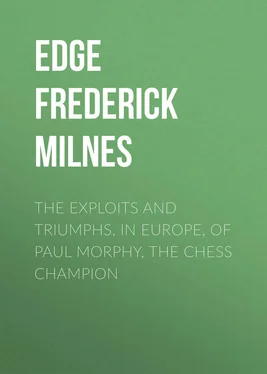Frederick Edge - The Exploits and Triumphs, in Europe, of Paul Morphy, the Chess Champion
Здесь есть возможность читать онлайн «Frederick Edge - The Exploits and Triumphs, in Europe, of Paul Morphy, the Chess Champion» — ознакомительный отрывок электронной книги совершенно бесплатно, а после прочтения отрывка купить полную версию. В некоторых случаях можно слушать аудио, скачать через торрент в формате fb2 и присутствует краткое содержание. Жанр: Развлечения, foreign_antique, foreign_prose, на английском языке. Описание произведения, (предисловие) а так же отзывы посетителей доступны на портале библиотеки ЛибКат.
- Название:The Exploits and Triumphs, in Europe, of Paul Morphy, the Chess Champion
- Автор:
- Жанр:
- Год:неизвестен
- ISBN:нет данных
- Рейтинг книги:4 / 5. Голосов: 1
-
Избранное:Добавить в избранное
- Отзывы:
-
Ваша оценка:
- 80
- 1
- 2
- 3
- 4
- 5
The Exploits and Triumphs, in Europe, of Paul Morphy, the Chess Champion: краткое содержание, описание и аннотация
Предлагаем к чтению аннотацию, описание, краткое содержание или предисловие (зависит от того, что написал сам автор книги «The Exploits and Triumphs, in Europe, of Paul Morphy, the Chess Champion»). Если вы не нашли необходимую информацию о книге — напишите в комментариях, мы постараемся отыскать её.
The Exploits and Triumphs, in Europe, of Paul Morphy, the Chess Champion — читать онлайн ознакомительный отрывок
Ниже представлен текст книги, разбитый по страницам. Система сохранения места последней прочитанной страницы, позволяет с удобством читать онлайн бесплатно книгу «The Exploits and Triumphs, in Europe, of Paul Morphy, the Chess Champion», без необходимости каждый раз заново искать на чём Вы остановились. Поставьте закладку, и сможете в любой момент перейти на страницу, на которой закончили чтение.
Интервал:
Закладка:
When the Westminster had grown up into a goodly body of three hundred members, Mr. George Walker began to find that the duties of secretary were interfering seriously with his other pursuits, and he therefore resigned the office, and was succeeded by Mr. William Greenwood Walker, to whom the chess world is so much indebted for taking down the games of McDonnel. The Club had arrived at its Augustine era, and, in 1838, its fortunes began to wane; the proprietor getting into pecuniary difficulties. Mr. Huttman could not let well alone. He introduced a daily dinner, on plans so profoundly calculated, that the more persons who dined the more he lost. He got the Club, also, into bad odor, by allowing chess to be played there on Sundays. Musical soirées and other nonsense followed; the main object of the establishment thus became ignored, and, instead of new members joining, the old ones fell off one by one, and the princely mansion in Bedford street was shortly to let. Mr. Huttman's pecuniary difficulties perilled the very existence of the Club, notwithstanding that the members handed over to him the reserve fund, amounting to a few hundred pounds. No Club can be said to be in safety without such a fund upon which to fall back in case of emergency, as for instance, retirement of members. Members of chess clubs will retire – prominent ones even – a very frequent cause being marriage; the backsliders, however, often come back eventually.
The Westminster Club being now without house or home, looked about for some benevolent individual who would "take them in and do for them." Such an one they found in Mr. Ries, proprietor of the Divan in the Strand, who offered them private rooms in his establishment; thither the débris of the old Westminster forthwith removed. Each member was provided with a latch-key, with which to let himself in at the private door. Here it was that Mr. Staunton appeared for the first time in chess-circles, although he was never a member of the Westminster Club. In its new quarters the association drew out an existence of twelve months, giving up the ghost in 1840.
About this time, the veteran writer and encyclopædist, Alexandre, made a lamentable fiasco at his Café de l'Echiquiér in Paris; an establishment which he vainly hoped would entice away the habitués of the Cafés de la Régence et de Procope. Coming over to London, he made the acquaintance of Mr. Staunton, and the two players struck hands together, and resolved to open a chess establishment as a partnership concern. Alexandre put in his little all – the change out of his Paris capital – and he and his coadjutor opened rooms at the Waterloo Chambers. A very good locality, perhaps too good, for rents in that neighborhood are rather high. Some twenty or thirty old players rallied round them, but the attempt was only of short duration. The two camarades took to squabbling and vilifying each other; and, within a year, the Club was formally dissolved at the request of the members.
All connection now being severed between the members and Messrs. Alexandre and Staunton, the amateurs convened a private meeting for the purpose of examining their prospects and taking steps for reorganization. Mr. George Walker advertised for a large room, and was answered by Mr. Beattie, proprietor of Beattie's Hotel, George street, Hanover square. Here, once again, the remains of the "old guard" planted their standard, and in special, solemn convocation, under a full sense of their responsibility, and with all due solemnity, they christened their Club the name being suggested, in the first place, by the baptismal appellative of their virtual founder and Hon. Sec., Mr. George Walker; and, secondly, because the meeting was in George street, in the parish of St. George's. The Club was exceedingly prosperous during the first year of its existence, much being due to the fostering care of Mr. B. Smith, M. P. for Norwich, who was assiduous in his attendance, and a capital "whipper-in" of members. The room was large, well proportioned, and well ventilated, cooking first-rate, wines unexceptionable. Wine, by the by, makes your game brilliant, if not sound. Dull, unimaginative Zsen would have been betrayed into an attempt at brilliance and dash, with a couple of bottles of "old crusted" under his belt. But it began to appear as though a West End Club could be nought but an "annual." Mr. Beattie failed in business, and the St. George's were turned out of doors, wanderers for a season, without prospect of refuge. And the devotees of Caïssa were on the town for some weeks, two or three of the leading and most active assiduously on the watch to find a fresh location, but almost in blank despair as to the result.
Mr. B. Smith was a large shareholder in the Polytechnic Institution, Regent street. The managing committee of that estimable establishment were, about this time, endeavoring to form reading-rooms by subscription, in the first floor of their building, facing Cavendish square. It was suggested to the committee that chess and reading might be combined; that one large room facing the square should be set apart for reading exclusively, and two smaller ones be devoted to chess. A meeting was forthwith convened, Mr. Nurse representing the proprietors of the Institution, the chess players present being Mr. B. Smith, Mr. Richard Penn, and the indefatigable and indomitable George Walker. These three gentlemen guaranteed that one hundred members, paying an annual subscription of three guineas each, should be enrolled in the Chess Club within twelve months; and, once again, the red cross of the St. George's was floating bravely in the air. Forthwith commenced the hunting up of old members of the Westminster and other West End Clubs: touching and tender circulars were issued by Mr. Walker, adjuring the straggling devotees of Caïssa, by all the recollections of their first and early loves, by all their hopes of a glorious hereafter, to rush once more to the rescue. Could such pathetic appeals fall unheeded upon the chess-lover's ear? No. A hundred and fifty members reiterated "no" to the accompaniment of their one hundred and fifty three-guinea subscriptions. "Royal Blue-Book" notabilities enrolled themselves; as, for instance, the present Lord Ravensworth, Dr. Murray, Lord Bishop of Rochester, the Honorable Charles Murray, Mr. Brooke Greville, Mr. Albany Fonblanque, the Messrs. Hampton, Lord Clarence Paget, and a host of other fashionables. So the St. George's flourished for years, and it began to appear that a Chess Club at the West End could, under proper management, become a permanent institution.
It was in this locale that Mr. Staunton played his first match with Saint Amant, and, losing it, took his revenge by winning in his turn at Paris. For some reason or other, the French amateur displayed unaccountable nervousness during the progress of the match in his own capital. The Baronne de L – , who is well known in Parisian salons as an excellent player and firm supporter of the game, assured me but lately that she had no easy task in instilling courage into her countryman, startled as he was by Mr. Staunton's winning game after game from him. Warming up under the merry rebukes of his fair inspirer, Saint Amant began to turn the tables upon his antagonist, and it seemed as if he would anticipate the result of the contest between Löwenthal and Harrwitz. Mr. Staunton, however, eventually won, and the stakes were deposited for the third and deciding match, but Mr. S. was taken ill, and it was never played. It is unfortunate for Mr. Staunton's reputation that the plea of bad health was so frequently used by him when opponents appeared, more especially as he is the first to ridicule such an excuse when coming from others. And it is more than ever unfortunate in this instance, because the French players declared that, judging from the later games of the match in Paris, it was obvious that Mr. Staunton would have succumbed to their champion if the third and deciding heat had not been prevented by the Englishman's indisposition. And many of them even affirm that Mr. S. felt this and acted in consequence.
Читать дальшеИнтервал:
Закладка:
Похожие книги на «The Exploits and Triumphs, in Europe, of Paul Morphy, the Chess Champion»
Представляем Вашему вниманию похожие книги на «The Exploits and Triumphs, in Europe, of Paul Morphy, the Chess Champion» списком для выбора. Мы отобрали схожую по названию и смыслу литературу в надежде предоставить читателям больше вариантов отыскать новые, интересные, ещё непрочитанные произведения.
Обсуждение, отзывы о книге «The Exploits and Triumphs, in Europe, of Paul Morphy, the Chess Champion» и просто собственные мнения читателей. Оставьте ваши комментарии, напишите, что Вы думаете о произведении, его смысле или главных героях. Укажите что конкретно понравилось, а что нет, и почему Вы так считаете.












